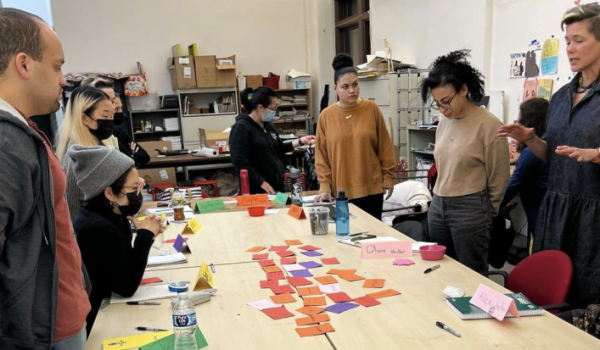
How an Arts Education Masters Can Transform Your Teaching Career in 2025. Pursuing higher education in the arts is more than just acquiring knowledge—it’s about reinventing your teaching career, enhancing creativity, and making a tangible impact on your students. In 2025, an Arts Education Masters opens a world of possibilities by bridging the gap between artistic innovation and modern pedagogical practices. This article delves into the myriad ways that an Arts Education Masters can transform your teaching career, addressing the changing landscape of education and underscoring why this advanced degree remains an essential asset for educators who are passionate about inspiring the next generation.
Arts Education Masters: Embracing a Holistic Teaching Philosophy
An Arts Education Masters is more than a degree; it is a holistic approach to learning, teaching, and personal growth. Teachers who pursue this advanced degree immerse themselves in both the theory and practice of art, which in turn helps them foster richer classroom experiences. Through courses that interweave art history, aesthetics, and creative pedagogy, educators can learn to create environments where students are encouraged to think critically and express themselves freely.
In today’s rapidly evolving educational framework, the integration of the arts nurtures innovative problem-solving skills. A teacher with an Arts Education Masters is equipped to introduce interdisciplinary projects that blend art with science, literature, technology, and even mathematics. This cross-curricular approach nurtures well-rounded learning and encourages students to view challenges from multiple perspectives.
Arts Education Masters: Advancing Creative Pedagogical Methods
One of the foremost benefits of earning an Arts Education Masters is the opportunity to acquire advanced creative pedagogical methods. In the modern classroom, educators are expected to go beyond traditional lectures and incorporate dynamic, interactive learning experiences. This advanced degree provides educators with the tools to implement project-based learning, digital art integrations, and experiential activities that capture the imagination of students. (Read More: Advancing Your Career with an Art Education Degree Online).
Courses within an Arts Education Masters program often include workshops on creative curriculum design, innovative classroom management strategies, and the use of art to enhance cognitive development. Whether you’re teaching in a traditional school setting or an alternative educational environment, the methodologies learned during this master’s program can be adapted to suit your teaching style and the unique needs of your students.
Arts Education Masters: Cultivating an Innovative Mindset in 2025
As we step into 2025, technology and digital tools have become pivotal in education. Teachers are now expected to be technologically adept and capable of integrating digital art forms into their lessons. An Arts Education Masters not only encourages traditional artistic disciplines but also emphasizes the importance of digital media, interactive platforms, and online collaboration tools. This dual approach ensures that educators are prepared to navigate both conventional and modern educational landscapes. (Read More: The Future of Art Teaching: Earning Your Art Education Degree Online).
The curriculum is designed to develop an innovative mindset by encouraging educators to experiment with various art forms such as video production, graphic design, and digital storytelling. These skills are increasingly relevant in today’s classrooms where multimedia presentations and virtual collaborations are the norm. Ultimately, an Arts Education Masters helps you transform your approach to teaching by opening up new avenues for creativity and engagement.
Arts Education Masters: Building Professional Networks and Collaborative Communities

An often overlooked benefit of pursuing an Arts Education Masters is the opportunity to build strong professional networks within the education and arts communities. Graduate programs bring together a diverse group of educators, artists, and researchers, fostering an environment of collaboration and mutual growth. These relationships are invaluable as they lead to creative partnerships, collaborative projects, and sometimes lifelong friendships.
Networking events, conferences, and collaborative projects integrated into the curriculum expose you to a range of perspectives and strategies that you can bring back to your classroom. Additionally, these connections might lead to career advancements, such as leadership roles in curriculum development or positions in artistic organizations. The community you build while pursuing an Arts Education Masters is a powerful resource that extends well beyond graduation.
Arts Education Masters: Enhancing Personal Artistic Practice
Teachers are lifelong learners, and the arts have a unique way of inspiring continuous personal development. With an Arts Education Masters, you not only improve your teaching skills but also deepen your own engagement with artistic practices. This dual focus helps you develop a more nuanced understanding of art that can be reflected in your teaching. (Read More: Pursuing an Art Education Degree Online: Top Programs and Benefits).
By engaging in workshops, studio classes, and collaborative projects, you have the opportunity to experiment with new mediums and techniques. This personal enrichment makes your teaching more authentic, as your passion for art translates into a more engaging and supportive classroom environment. Your improved skills are not confined to the theoretical realm—they become a vibrant part of your daily interactions with students, setting an example of continuous growth and exploration.
Arts Education Masters: Opening Doors to Leadership and Curriculum Development
With an Arts Education Masters, career progression is not limited to the classroom. Many educators leverage their advanced degrees to step into leadership roles such as curriculum coordinators, department heads, or administrative positions in schools and educational organizations. The specialized knowledge gained throughout your studies equips you to play a key role in shaping educational programs that integrate artistic principles with academic rigor.
Curriculum development is a critical area where your advanced qualifications can shine. With a robust understanding of both pedagogical theory and artistic practice, you’re well-positioned to design curricula that are not only academically sound but also rich in creative potential. These innovative programs can transform educational settings, making learning more engaging and relevant for students of all ages.
Arts Education Masters: Navigating Career Shifts and New Opportunities in 2025

The teaching landscape is undergoing rapid change, and educators with an Arts Education Masters are uniquely positioned to navigate these shifts. In today’s interconnected world, there’s a growing demand for teaching professionals who can blend creativity with academic excellence. Whether you are an experienced teacher looking to refresh your career or a new educator seeking to enter the field, this advanced degree offers you a chance to remain relevant in an evolving marketplace.
In 2025, schools and educational institutions are increasingly valuing educators who bring innovative teaching techniques to the table. Graduates with an Arts Education Masters are in high demand due to their ability to connect with students through creative expression and digital literacy. This versatility means that your career options are broader, allowing you to explore roles in public schools, private institutions, or specialized arts academies. Additionally, many educators find that their advanced degree opens up possibilities in consulting, non-profit work, and community arts projects.
Arts Education Masters: Fostering a Student-Centered Learning Environment
One of the most significant advantages of an Arts Education Masters is the focus on student-centered learning. By incorporating artistic methodologies into their teaching, educators create classrooms that cater to diverse learning styles and encourage active participation. This approach is designed to make learning a more engaging, interactive, and reflective process.
When you integrate arts into your teaching practice, you provide students with multiple ways to express their understanding and creativity. This diversity in teaching methods not only cultivates critical thinking but also helps in addressing different learning needs. A dynamic classroom atmosphere, bolstered by an Arts Education Masters, nurtures open dialogue, personal expression, and collaborative projects—elements that are key to unlocking the full potential of every student.
Arts Education Masters: Integrating Research, Theory, and Practical Experience
An integral part of an Arts Education Masters program is the balance between research, theory, and hands-on experience. Coursework is designed to push educators to think critically about both the historical context and contemporary applications of art in education. This intellectual rigor ensures that you are not only an effective instructor but also a well-informed advocate for the arts.
The blend of academic research and practical application fosters an environment where innovative ideas are encouraged. Educators learn to analyze educational trends, assess the impact of various teaching methodologies, and implement the most effective strategies within their own classrooms. This comprehensive approach transforms your teaching career by enhancing your ability to adapt and respond to the evolving needs of modern learners.
Arts Education Masters: Embracing Lifelong Learning and Innovation

The pursuit of an Arts Education Masters is a journey of lifelong learning and personal innovation. Education is an ever-changing field, and those who choose to further their studies are continually exposed to new ideas, technologies, and teaching techniques. This commitment to ongoing education fuels your passion as a teacher and helps you stay at the forefront of educational innovation.
The spirit of lifelong learning is embedded in the very fabric of an Arts Education Masters program. Every course and workshop contributes to a broader understanding of how the arts intersect with educational theory and practice. As you explore new artistic disciplines and innovative teaching methods, you become a beacon of inspiration for your students, modeling the value of intellectual curiosity and creative exploration.
With this advanced degree, you are empowered to adapt to emerging trends, address contemporary challenges, and transform your teaching strategies to meet the diverse needs of your students. The skills and insights gained from an Arts Education Masters resonate not only within the classroom but also throughout your entire educational career, stimulating ongoing personal and professional growth.
By embracing the opportunities that an Arts Education Masters provides, you can redefine your teaching career and set an example for future educators. Your journey into the advanced study of arts education becomes a catalyst for creative change, inspiring both your peers and students alike.




